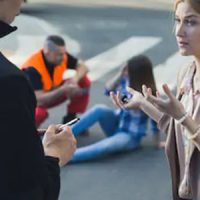The Benefits Of Car Accident Witness Statements

Car accident victims, besides grappling with painful injuries, are also often forced to jump through a variety of hoops when filing a claim with their insurers, taking time off from work, and attempting to stay on top of medical bills and vehicle repair costs. This can be especially frustrating for those who were injured in accidents because of another driver’s negligence. Fortunately, it is possible to hold careless drivers accountable for their actions by filing a third party claim against them in court. Filing a successful claim will, however, require a wide range of convincing evidence, including witness statements. To learn more about the types of evidence that you may need when attempting to recover damages after a crash, please reach out to our dedicated Fort Lauderdale auto accident lawyers today.
What are Car Accident Witness Statements?
Car accident witness statements are recorded accounts of third parties who saw an accident happen and can explain what they saw. These statements often contain vital details that can be used as evidence to prove fault in a case. Witness testimony is sometimes given more weight than the testimony of the parties involved, who may be biased when remembering the collision. Third parties who saw the accident, on the other hand, can give an objective accounting of what happened on the day in question. If a car accident case eventually makes its way to trial, the witness can even take the stand and testify as to what he or she saw at the scene of the crash.
Witness Statements Can Benefit Your Case
Witness statements can benefit a car accident victim’s case in a number of ways. For instance, because Florida adheres to a comparative negligence standard, these statements can be used (in cases where both parties share some of the blame for causing an accident) to reduce the blame being placed on the plaintiff. While the comparative negligence rule will still reduce the amount that a plaintiff can recover after a crash, a supporting witness statement can lower fault significantly, thereby minimizing how much is taken out of a plaintiff’s settlement award.
Witness statements can also help support a claimant’s assertions regarding the injuries that he or she sustained during the accident. An objective statement explaining what the witness saw can help reinforce the link between the victim’s injuries and a particular collision. Without this kind of supporting evidence, at-fault drivers may try to argue that a plaintiff is exaggerating the claim.
Finding Witnesses
The best way to find a witness after an accident is to take down the contact information of any bystanders who remained at the scene after the crash. The victim’s attorney can eventually reach out to these individuals at a later date to obtain their official statements. Some witnesses will even give their information, or their statement to the police at the scene of the accident, who will then include the information in their official reports. For those who were too injured to identify witnesses, it can be helpful to check video recordings from nearby traffic lights and businesses to locate witnesses.
Working with a Fort Lauderdale Auto Accident Attorney
Call Boone & Davis at 954-566-9919 or provide us with your information by completing one of our free case evaluations forms to set up an appointment with one of our dedicated Florida car accident lawyers.
Resource:
leg.state.fl.us/statutes/index.cfm?App_mode=Display_Statute&URL=0700-0799/0768/Sections/0768.81.html
